FiltersFilter & Sort
- From $299 USDUnit price /Unavailable
Description
 Chicory - Witloof (100% Heirloom/Non-Hybrid/Non-GMO)
Chicory - Witloof (100% Heirloom/Non-Hybrid/Non-GMO)- Witloof Chicory produces heads that have gorgeous light green leaves.
- A perfect variety for summer and fall harvest.
- Can be used in salads or as a coffee substitute.
- Day to Maturity | 55 days
Additional DetailsChicory is a somewhat woody, perennial herbaceous plant usually with bright blue flowers, rarely white or pink. Various varieties are cultivated for salad leaves, chicons (blanched buds), or for roots which are baked, ground, and used as a coffee substitute and additive. It is also grown as a forage crop for livestock. It lives as a wild plant on roadsides in its native Europe, and in North America and Australia, where it has become naturalized. Credit: http://en.wikipedia.org/wiki/Chicory
- Witloof Chicory produces heads that have gorgeous light green leaves.
Cilantro/Coriander, Slow-Bolt (splits)
From $299 USDUnit price /UnavailableDescription

Cilantro is the most popular leafy aromatic herb with a tangy citrusy-parsley-like flavor, used in Latin and Asian cuisines.
Coriander is the dried seed, whole or powdered, with an earthy, floral flavor used as a spice in Indian cuisine. Grow it just for the seeds or the tiny pinkish flowers, which are quite sweet.
Cilantro prefers cool weather, and this slow-bolt variety will tolerate a bit more heat, putting out more leaves for a longer time before it starts bolting out tasty flowers and Coriander seeds.
Leaves, stems, flowers, seeds, and root of this fast-growing herb are all edible. It also likes shady spots, so a good one to grow indoors.
- Citrusy-parsley-like flavor
- All parts are edible
- Grows 1'-2' tall
- Good for indoor gardens
As a companion plant, it attracts pollinators and beneficial insects, and repels aphids, carrot rust fly, grasshoppers, mosquitoes, potato beetles, and spider mites.As a medicinal herb, Coriander has been used internally to treat anxiety, arthritis, bad breath, colic, constipation, diabetes, diarrhea, flatulence, indigestion, inflammation, insomnia, lack of appetite, nausea, nervousness, pain, stomach cramps, and urinary tract infections (UTIs), and externally to treat rheumatism, headache, joint pain, and tired eyes.
⚠️ Medicinal properties are presented as information only, and are not a recommendation or prescription for use. Consult a medical professional before using any herb medicinally.
Good companion plants: Anise, Asparagus, Basil, Broccoli, Brussels Sprouts, Cabbage, Carrot, Celery, Chervil, Collards, Cumin, Dill, Kale, Kohlrabi, Lemongrass, Lettuce, Mint, Mustard, Oregano, Parsley, Parsnip, Pea, Potato, Rutabaga, Spinach, Squash, Tomato, Turnip, Zucchini
More facts about Cilantro/Coriander:
- This slow-bolting strain is grown primarily for its broad, deep green, celery-like, pungent foliage.
- Used in Oriental and Mexican cuisine.
- Use seed to flavor meats, pickles and baked goods.
- Coriander contains antioxidants. It has also been used as a folk medicine for the relief of anxiety and insomnia. Coriander has also been documented as a traditional treatment for diabetes.
See Cilantro/Coriander Recipes & Growing Tips on our Pinterest Board
Follow SeedsNow.com's board Cilantro on Pinterest. Eggplant - Long Green Louisiana
From $299 USDUnit price /UnavailableDescription

- Solanum melongena. Produces excellent yields of 9" long/glossy light green eggplants
- White flesh
- Very delicious with nutty flavor and no bitterness
- Excellent for Creole fish stew and other culinary creations -
Days to Maturity | 65 days
-
Eggplant Seeds | Start seed indoors to allow at least 10 weeks for young plants to develop. Plant in rows 3 feet apart, with 2 feet between plants.
Click here for complete Eggplant grow guide
- Solanum melongena. Produces excellent yields of 9" long/glossy light green eggplants
- From $299 USDUnit price /Unavailable
Description

- Very early producer of 11" long and thin fruits. Perfect for stir fries!
- One of the only eggplants that are not bitter and does not require any peeling
- The fruits start out bright lavender and change to darker purple when mature
- Vigorous and stress resistant plant
- Produces well in the north and all across the US
-
Days to Maturity | 55-60 days
-
Eggplant Seeds | Start seed indoors to allow at least 10 weeks for young plants to develop. Plant in rows 3 feet apart, with 2 feet between plants.
Click here for complete Eggplant grow guide
- Very early producer of 11" long and thin fruits. Perfect for stir fries!
- From $299 USDUnit price /Unavailable
Description
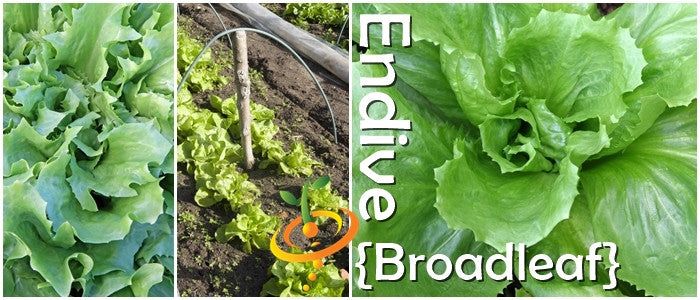
- Endive is a leafy vegetable belonging to the daisy family
- Endive can be cooked or used raw in salads
- Rich in many vitamins and minerals, especially in folate and vitamins A and K, and is high in fiber
- Days to Maturity | 50-60 days
- Endive is a leafy vegetable belonging to the daisy family
Endive - Broadleaf, Full Heart Batavian
From $299 USDUnit price /UnavailableDescription

-
This plant produces excellent yields of dark green curly leaves with large tender crisp ribs
- An excellent choice for salads greens
- Endive is rich in many vitamins and minerals, especially in folate and vitamins A and K, and is high in fiber
- Days to Maturity | 80-90 days
-
This plant produces excellent yields of dark green curly leaves with large tender crisp ribs
- From $299 USDUnit price /Unavailable
Description

- Endive is a healthy and delicious leafy green. The Green Curled Endive plant produces dark green curly leaves with large tender crisp ribs
- Excellent salads and sandwiches
- Also boiled or steamed
- Extremely easy to grow
- Endive is rich in many vitamins and minerals, especially in folate and vitamins A and K, and is high in fiber
- Days to Maturity | 90 days
- Endive is a healthy and delicious leafy green. The Green Curled Endive plant produces dark green curly leaves with large tender crisp ribs
Garlic - (Soft Neck) Early Purple Italian (Organic)
From $299 USDUnit price /UnavailableDescription

Quick Overview
• Organic• Best Seller!
• Early
• An excellent variety for hot climates• Mild Flavor
• Purple stripes
Details
The bulb is large and white-skinned with purple stripes and numerous small cloves. Widely grown around Gilroy, California, the "garlic capital" of the world.How to Plant Garlic
Garlic can be planted in the spring as soon as the ground can be worked, but fall planting is recommended. Bulbs will grow bigger and more flavorful when you plant them in the fall. Plant 6 to 8 weeks before your first hard frost. In southern areas, February or March can be a better time to plant.
Key Planting Info:
- Break apart cloves from bulb but keep the papery husk on each individual clove.
- Ensure soil is well-drained with plenty of organic matter. Plant in Full Sun.
- Plant 4 inches apart & 2 inches deep, in their upright position (the wide end down and pointed end facing up).
- Come springtime, shoots will begin to emerge.
Click here for a more detailed Garlic Grow Guide ->Garlic - (Soft Neck) Nootka Rose (Organic)
From $299 USDUnit price /UnavailableDescription

This heirloom garlic has medium to large bulb.
- Beautifully bright white skin with light rose-colored streaked cloves
- Very attractive for braiding.
- Excellent flavor.
- Strong flavor.
- In rich soil, cloves can lose their rosy hue.
- This variety of garlic has long shelf-life and will store well into next spring or even summer.
How to Plant Garlic
Garlic can be planted in the spring as soon as the ground can be worked, but fall planting is recommended. Bulbs will grow bigger and more flavorful when you plant them in the fall. Plant 6 to 8 weeks before your first hard frost. In southern areas, February or March can be a better time to plant.
Key Planting Info:
- Break apart cloves from bulb but keep the papery husk on each individual clove.
- Ensure soil is well-drained with plenty of organic matter. Plant in Full Sun.
- Plant 4 inches apart & 2 inches deep, in their upright position (the wide end down and pointed end facing up).
- Come springtime, shoots will begin to emerge.
Garlic - (Soft Neck) Silver Rose
From $299 USDUnit price /UnavailableDescription

This heirloom garlic has medium to large bulb.
- Rose-colored cloves in very smooth bright-white bulbs.
- Mild flavor
- Beautiful garlic to braid!
- The longest-storing garlic we sell.
- Fast-growing garlic.
- Very popular in western and southern US and in France and Italy.
How to Plant Garlic
Garlic can be planted in the spring as soon as the ground can be worked, but fall planting is recommended. Bulbs will grow bigger and more flavorful when you plant them in the fall. Plant 6 to 8 weeks before your first hard frost. In southern areas, February or March can be a better time to plant.
Key Planting Info:
- Break apart cloves from bulb but keep the papery husk on each individual clove.
- Ensure soil is well-drained with plenty of organic matter. Plant in Full Sun.
- Plant 4 inches apart & 2 inches deep, in their upright position (the wide end down and pointed end facing up).
- Come springtime, shoots will begin to emerge.
Click here for a more detailed Garlic Grow Guide ->- From $299 USDUnit price /Unavailable
Description

- Just as the name suggests, this style of gourd will produce something that looks like a caveman's club
- Colors will vary
- Grows well in raised beds
- Just as the name suggests, this style of gourd will produce something that looks like a caveman's club
- From $299 USDUnit price /Unavailable
Description
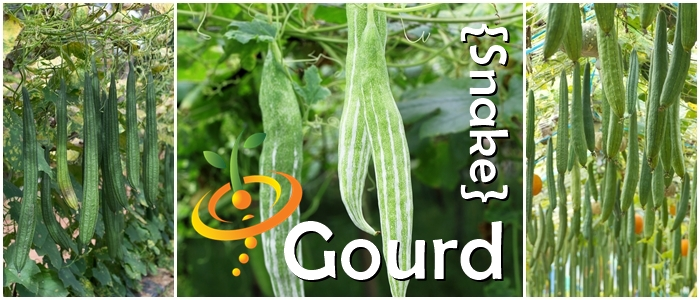
- Also known as "Slippery Snake"
- Grows long light green snake-like shaped gourds
- Grows as a long vine
- If you like to grow gourds then you'll be sure to appreciate this one
- Also known as "Slippery Snake"
- From $299 USDUnit price /Unavailable
Description

-
Member of the squash family. Produces an assortment of small gourds of various shapes, sizes, and colors
- Excellent for making crafts, birdhouses, dippers, and ornaments
- Great for arts & crafs projects
- The hard-rinded fruits can have carving done to create scenes raised in relief, painting, and wood burning are also used to decorate the shells
-
Member of the squash family. Produces an assortment of small gourds of various shapes, sizes, and colors
- From $299 USDUnit price /Unavailable
Description

- The leaves of the Horehound plant are widely used to flavor juices and teas. Horehound is used to make hard lozenge candies that are considered by folk medicine to aid digestion, soothe sore throats, and relieve inflammation.
- Easy to grow from seed and can be sowed directly in the garden
- Plant in a sunny location with well-drainage
-
Days to Maturity | 75 days
See Horehound Recipes & Growing Tips on our Pinterest Board
Follow SeedsNow.com's board Horehound on Pinterest. - The leaves of the Horehound plant are widely used to flavor juices and teas. Horehound is used to make hard lozenge candies that are considered by folk medicine to aid digestion, soothe sore throats, and relieve inflammation.
- From $299 USDUnit price /Unavailable
Description
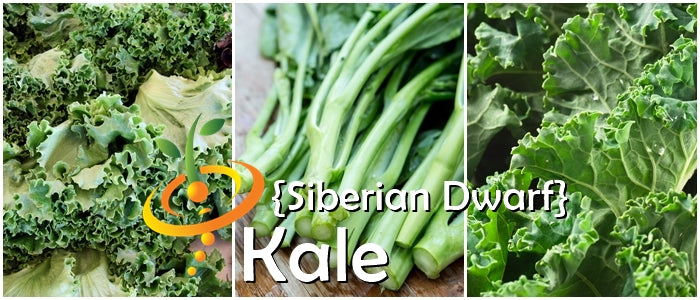
-
Early Kale variety produces flavorful leaves
- The dark-green leaves are finely curled and reach up to 8-12"
- Great when used fresh in salads or on sandwiches
- Can handle the cold extremely well
- Very good frost resistant kale variety
-
Days to Maturity | 50 days
-
Kale Seeds | Kale can be planted pretty much anywhere in the United States where there's a cool fall growing season. Plant Kale in rows 18 inches to 2 feet apart.
Click here for complete Kale grow guide
Additional DetailsKale is considered to be a highly nutritious vegetable with powerful antioxidant properties; kale is considered to be anti-inflammatory. Kale is very high in beta carotene, vitamin K, vitamin C, lutein, zeaxanthin, and reasonably rich in calcium.
Follow SeedsNow.com's board Kale on Pinterest. -
Early Kale variety produces flavorful leaves
- From $299 USDUnit price /Unavailable
Description
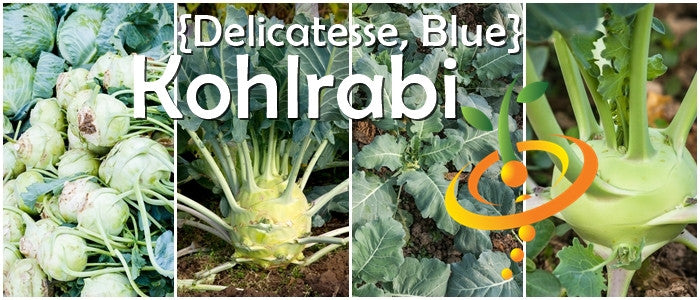
- This Kohlrabi variety produces extremely tender round bulbs
- Best to harvest when bulbs reach 4" across
- Well known for uniform size and disease resistance
- Kohlrabi looks like a turnip growing above-ground
-
Days to Maturity | 55-60 days
-
Kohlrabi Seeds | Grow Kohlrabi in loose, average soil. Direct-sow your seeds 4 to 6 weeks before the last frost in your growing zone; about ¼ inch deep, and 10 seeds per foot.
Click here for complete Kohlrabi grow guide
Kohlrabi is one of the most commonly eaten vegetables in Kashmir. Locally called monj, the vegetable is eaten along with the leaves (haakh). A Kashmiri household may have this on their dinner or lunch plates three to four times a week.
- This Kohlrabi variety produces extremely tender round bulbs
- From $299 USDUnit price /Unavailable
Description
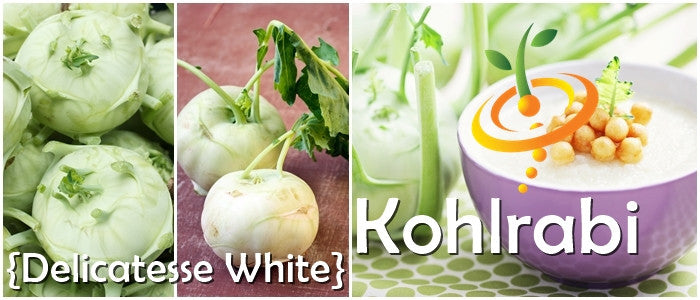
- This Kohlrabi variety produces extremely tender round bulbs
- Kohlrabi looks like a turnip growing above-ground
- Best to harvest when bulbs reach 4" across
- Well known for uniform size and disease resistance
-
Days to Maturity | 55-60 days
-
Kohlrabi Seeds | Grow Kohlrabi in loose, average soil. Direct-sow your seeds 4 to 6 weeks before the last frost in your growing zone; about ¼ inch deep, and 10 seeds per foot.
Click here for complete Kohlrabi grow guide
Additional Detail
Kohlrabi is one of the most commonly eaten vegetables in Kashmir Locally called monj, the vegetable is eaten along with the leaves (haakh). A Kashmiri household may have this on their dinner or lunch plates three to four times a week.
- This Kohlrabi variety produces extremely tender round bulbs
- From $299 USDUnit price /Unavailable
Description

- Bulb is pale green with tender, white, crisp flesh
- Kohlrabi looks like a turnip growing above-ground
- Eat when bulbs are 2 inches in diameter
-
Days to Maturity | 65 days
-
Kohlrabi Seeds | Grow Kohlrabi in loose, average soil. Direct-sow your seeds 4 to 6 weeks before the last frost in your growing zone; about ¼ inch deep, and 10 seeds per foot.
Click here for complete Kohlrabi grow guide
Additional Details
Kohlrabi is one of the most commonly eaten vegetables in Kashmir Locally called monj, the vegetable is eaten along with the leaves (haakh). A Kashmiri household may have this on their dinner or lunch plates three to four times a week.
- Bulb is pale green with tender, white, crisp flesh
- From $299 USDUnit price /Unavailable
Description
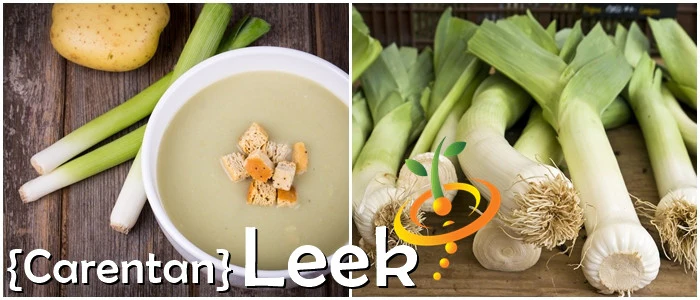
- Looks similar to large scallions and has an onion flavor
- The foliage is green with white bottoms
- Leek can be planted up to 4 weeks before last frost
-
Days to Maturity | 90-110 days
-
Leek Seeds | Plant leeks in the spring, and late in the summer or fall. Plant leek seedlings 8-10 inches apart.
Click here for complete Leek grow guide
Additional Details
The leek is one of the national emblems of Wales, worn along with the daffodil (in Welsh, the daffodil is known as "Peter's Leek," Cenhinen Bedr) on St. David’s Day.
- Looks similar to large scallions and has an onion flavor
- From $299 USDUnit price /Unavailable
Description

- Mild, sweet, onion-like flavor
- A very hardy variety
- Blue-green leaves resemble giant scallions
-
Days to Maturity | 100 days
-
Leek Seeds | Plant leeks in the spring, and late in the summer or fall. Plant leek seedlings 8-10 inches apart
Click here for complete Leek grow guide
- Mild, sweet, onion-like flavor
- From $299 USDUnit price /Unavailable
Description

- Beautiful bright lime green lettuce leaves
- This is the green alternative to Lollo Rossa
- Compact and curly with amazing flavor
- Extremely popular amongst gourmet chefs and restaurants
- Easy to grow and does not require a lot of space
-
Days to Maturity | 50 days
-
Lettuce Seeds | Lettuce can be grown practically anywhere. For leaf types seed should be sown thinly in rows 1 foot apart. For head, Bibb, and cos types, space rows 18 inches apart.
Click here for complete Lettuce grow guide
- Beautiful bright lime green lettuce leaves
- From $299 USDUnit price /Unavailable
Description

- Beautiful red lettuce leaves
- Curly leaves with really nice texture and color
- Extremely popular amongst gourmet chefs and restaurants
- Easy to grow and does not require a lot of space
-
Days to Maturity | 50 days
-
Lettuce Seeds | Lettuce can be grown practically anywhere. For leaf types seed should be sown thinly in rows 1 foot apart. For head, Bibb, and cos types, space rows 18 inches apart.
Click here for complete Lettuce grow guide
- Beautiful red lettuce leaves
- From $299 USDUnit price /Unavailable
Description

-
Produces excellent yields of 18" long yellow melons.
- The orange flesh is extremely tender and juicy
- Has a banana flavor
-
Days to Maturity | 90 days
-
Melon Seeds | Because of the long growing season, start plants indoors 4 to 5 weeks before outdoor planting time. Direct sow 4-5 seeds in a hill and then thin to the appropriate spacing.
Click here for complete Melon grow guide
-
Produces excellent yields of 18" long yellow melons.
Melon (Honeydew) - Green Flesh
From $299 USDUnit price /UnavailableDescription

- This is a delicious melon with a sweet green flesh
- Produces large 6 1/2 x 6" melons and weighs about 5 lbs
-
Days to Maturity | 85-100 days
-
Melon Seeds | Because of the long growing season, start plants indoors 4 to 5 weeks before outdoor planting time. Direct sow 4-5 seeds in a hill and then thin to the appropriate spacing.
Click here for complete Melon grow guide
- This is a delicious melon with a sweet green flesh
Melon (Cantaloupe) - Hales Best Jumbo
From $299 USDUnit price /UnavailableDescription

- The Hales Best Jumbo is a cantaloupe that yields large, oval, ribbed fruits weighing up to 5 to 6 pounds
- Traditional favorite
- Heavy netting and fine textured with a bright orange flesh
- Holds a sweet flavor longer than most
- Drought tolerant variety that thrives in warm temps
- Excellent source of vitamin C.
-
Days to Maturity | 85-100 days
-
Melon Seeds | Because of the long growing season, start plants indoors 4 to 5 weeks before outdoor planting time. Direct sow 4-5 seeds in a hill and then thin to the appropriate spacing.
Click here for complete Melon grow guide
- The Hales Best Jumbo is a cantaloupe that yields large, oval, ribbed fruits weighing up to 5 to 6 pounds
Melon (Honeydew)- Orange Flesh
From $299 USDUnit price /UnavailableDescription

- This is a delicious melon with a sweet orange flesh
-
Days to Maturity | 85-100 days
-
Melon Seeds | Because of the long growing season, start plants indoors 4 to 5 weeks before outdoor planting time. Direct sow 4-5 seeds in a hill and then thin to the appropriate spacing.
Click here for complete Melon grow guide
Melon (Cantaloupe) - Planters Jumbo
From $299 USDUnit price /UnavailableDescription

-
The Planters Jumbo melon produces a very sweet and delicious fruit that matures to about 5lbs
- Thick and protective rind
- Orange flesh
- Extremely juicy
- Has a pretty small seed cavity
- Tolerant of heat and drought
- Can also tolerate heavy rainfall
- Excellent source of vitamin C
-
Days to Maturity | 85 days
-
Melon Seeds | Because of the long growing season, start plants indoors 4 to 5 weeks before outdoor planting time. Direct sow 4-5 seeds in a hill and then thin to the appropriate spacing.
Click here for complete Melon grow guide
-
The Planters Jumbo melon produces a very sweet and delicious fruit that matures to about 5lbs
- From $299 USDUnit price /Unavailable
Description

- The Giant Red mustard is a full-flavored mustard green
- The bright purple-tinted leaves and green midribs add color and zest to salads and sandwiches
-
Dasy to Maturity | 50 days
-
Mustard Seeds | When growing from seed, start them outdoors 3 weeks before the last frost. Plant seeds a 1/2" deep, and thin to 3 inches.
Click here for complete Mustard grow guide
Additional DetailsMustard is high in Vitamin A, B, and C. Mustard greens are very popular in the southern U.S. where they are generally slow-cooked with ham hocks or other smoked-pork products. Asian cuisines generally use mustard greens pickled or stir-fried.
- The Giant Red mustard is a full-flavored mustard green
Onion (Sets) - Ebenezer, White
From $299 USDUnit price /UnavailableDescription

Quick Overview
Medium sized, flat, onion with thin, unnoticeable translucent white skin with less waste when prepared. Fine, grained flesh, popular for pickling. Excellent keeper.
They are technically long day onions. However, they can be grown anywhere, down south they will be more grown like big scallions.
How to Plant Bulb Onions
Onion bulbs are quite hardy and can withstand 20° F frost. They should be set out 4-6 weeks prior to the last expected frost. When your plants arrive they should appear to be quite dry. DO NOT WET THEM NOR STICK THEIR ROOTS IN WATER. Unpack them and store them in a cool, dry place until it is time to plant. They should last about 3 weeks kept this way. Do not worry that your plants seem dry. They will "shoot" new roots and new, green tops as soon as they are planted.
- From $299 USDUnit price /Unavailable
Description

Quick Overview
Bronze yellow skin, mild, and sweet. Plant them close together if you want fast growing scallions.They are technically long day onions. However, they can be grown anywhere, down south they will be more grown like big scallions.
How to Plant Bulb Onions
Onion bulbs are quite hardy and can withstand 20° F frost. They should be set out 4-6 weeks prior to the last expected frost. When your plants arrive they should appear to be quite dry. DO NOT WET THEM NOR STICK THEIR ROOTS IN WATER. Unpack them and store them in a cool, dry place until it is time to plant. They should last about 3 weeks kept this way. Do not worry that your plants seem dry. They will "shoot" new roots and new, green tops as soon as they are planted. Onion (Sets) - Wethersfield, Red
From $299 USDUnit price /UnavailableDescription

Quick Overview
Large globe with very thin, reddish-purple colored skin.
The white flesh is very firm and tinged with pink or purple highlights.
Fine strong flavor, vigorous.They are technically long day onions. However, they can be grown anywhere, down south they will be more grown like big scallions.
How to Plant Bulb Onions
Onion bulbs are quite hardy and can withstand 20° F frost. They should be set out 4-6 weeks prior to the last expected frost. When your plants arrive they should appear to be quite dry. DO NOT WET THEM NOR STICK THEIR ROOTS IN WATER. Unpack them and store them in a cool, dry place until it is time to plant. They should last about 3 weeks kept this way. Do not worry that your plants seem dry. They will "shoot" new roots and new, green tops as soon as they are planted.Onion - Crimson Forest (Bunching)
From $299 USDUnit price /UnavailableDescription

-
Crimson Forest is a rare heirloom
- Dark red, burgundy, and purple colors
- Excellent for many culinary creations
- Grows well in containers and small spaces
- Easy to grow
-
Days to Maturity | 60 days
Onion Seeds | Onions are easy to grow, have a fairly short growing period and take up little space in the garden. Plant onions 1/4 inch deep and 3 to 4 inches apart in double rows, leaving 6 to 10 inches between rows.
Click here for complete Onion grow guide
-
Crimson Forest is a rare heirloom
Onion - Lisbon, White (Bunching)
From $299 USDUnit price /UnavailableDescription

-
White Lisbon is a very popular type of bunching onion
- Dark green leaves with long white stalks
- Stores well after harvest
- Excellent for many culinary creations
- A hot and cold resistant variety
- This variety is usually planted in the spring but it's also a great fall/winter crop as well
- Grows well in containers and small spaces
- Easy to grow
-
Days to Maturity | 65 days
Onion Seeds | Onions are easy to grow, have a fairly short growing period and take up little space in the garden. Plant onions 1/4 inch deep and 3 to 4 inches apart in double rows, leaving 6 to 10 inches between rows.
Click here for complete Onion grow guide
-
White Lisbon is a very popular type of bunching onion
- From $299 USDUnit price /Unavailable
Description

- Compact, 18 to 20 inch plant requires staking and should utilize a trellis
- Fine, sweet flavor when picked young
- Pods are 3 inches with 5 or 6 peas
- Easy to grow
- Days to Maturity | 60 days
- Peas are a cool season vegetable, and do best in a climate where there are two months of cool growing weather, either spring planting in the northern regions or fall planting in the warmer, southern regions. Plant seeds 4"-6" apart.
Click here for complete Pea grow guide
Additional DetailsPeas are high in vitamin A, vitamin C, B vitamins and lutein. Dry weight is about one-quarter protein and one-quarter sugar.
Pea (Snow) - Mammoth Melting Sugar
From $299 USDUnit price /UnavailableDescription
- This popular pea variety is sweet, sugary and tender
- This edible pod snow pea has made its place in home gardens for many years
- These pea pods are some of the biggest ( appx. 4-5")
- Makes for an excellent addition to stir fry
- Big white flowers are an bonus as they quickly turn into tasty peas
- This pea has been so successful it has been considered a commercial variety for generations
- Days to Maturity | 65-70 days
Additional DetailsPeas are high in vitamin A, vitamin C, B vitamins and lutein. Dry weight is about one-quarter protein and one-quarter sugar.
- From $299 USDUnit price /Unavailable
Description

- This variety has unusually large, thick pods that grow up to 5" long
- Medium green, flat pods are very tender and have a mild, sweet flavor that holds well into the season
- Vines grow 30-36 inches tall and are heavy producers making this variety one of the best producing snow peas available
- Shows resistance to common wilt, mosaic virus, and powdery mildew
-
Days to Maturity | 70 days
Peas are a cool season vegetable, and do best in a climate where there are two months of cool growing weather, either spring planting in the northern regions or fall planting in the warmer, southern regions. Plant seeds 4"-6" apart.
Click here for complete Pea grow guide
Additional Details
Peas are high in vitamin A, vitamin C, B vitamins and lutein. Dry weight is about one-quarter protein and one-quarter sugar.
- This variety has unusually large, thick pods that grow up to 5" long
- From $299 USDUnit price /Unavailable
Description

- Mammoth type snow pea with excellent flavor and easy to grow
- Excellent quality, string present as pod matures
- Resistant to Enation Virus, Powdery Mildew and Common Pea Wilt
- Vine height 16-30"
- 4" light green pea pods
-
Days to Maturity | 60 days
Pea Seeds | Peas are a cool season vegetable, and do best in a climate where there are two months of cool growing weather, either spring planting in the northern regions or fall planting in the warmer, southern regions. Plant seeds 4"-6" apart.
Click here for complete Pea grow guide
Additional DetailsPeas are high in vitamin A, vitamin C, B vitamins and lutein. Dry weight is about one-quarter protein and one-quarter sugar.
- Mammoth type snow pea with excellent flavor and easy to grow
- From $299 USDUnit price /Unavailable
Description

- Sweet dwarf "snap peas" are great fresh from the garden, with dips and salads. Also great steamed or stir-fried
- Peas grow on 24-30" vines that doesn't need support to grow
- Produces medium sized green peas with 3" pods
- Excellent flavor and easy to grow
-
Days to Maturity | 55-70 days
Pea Seeds | Peas are a cool season vegetable, and do best in a climate where there are two months of cool growing weather, either spring planting in the northern regions or fall planting in the warmer, southern regions. Plant seeds 4"-6" apart.
Click here for complete Pea grow guide
- Sweet dwarf "snap peas" are great fresh from the garden, with dips and salads. Also great steamed or stir-fried
- From $299 USDUnit price /Unavailable
Description

- The snap pea may be planted in spring as early as the soil can be worked
- Tolerates light frost when young
- High tolerance of hot temperatures
- Grow as a vine and requires a trellis or anything else the can climb along
-
Days to Maturity | 60 days
Pea Seeds | Peas are a cool season vegetable, and do best in a climate where there are two months of cool growing weather, either spring planting in the northern regions or fall planting in the warmer, southern regions. Plant seeds 4"-6" apart.
Click here for complete Pea grow guide
Additional DetailsPeas are high in vitamin A, vitamin C, B vitamins and lutein. Dry weight is about one-quarter protein and one-quarter sugar.
Follow SeedsNow.com's board Peas on Pinterest. - The snap pea may be planted in spring as early as the soil can be worked
- From $299 USDUnit price /Unavailable
Description

- The most productive pea variety suitable for warm weather
- Wando peas also tolerates the cold extremely well for early sowing
- Bush variety
-
Days to Maturity | 65 days
Pea Seeds | Peas are a cool season vegetable, and do best in a climate where there are two months of cool growing weather, either spring planting in the northern regions or fall planting in the warmer, southern regions. Plant seeds 4"-6" apart.
Click here for complete Pea grow guide
Additional DetailsPeas are high in vitamin A, vitamin C, B vitamins and lutein. Dry weight is about one-quarter protein and one-quarter sugar.
- The most productive pea variety suitable for warm weather
- From $299 USDUnit price /Unavailable
Description
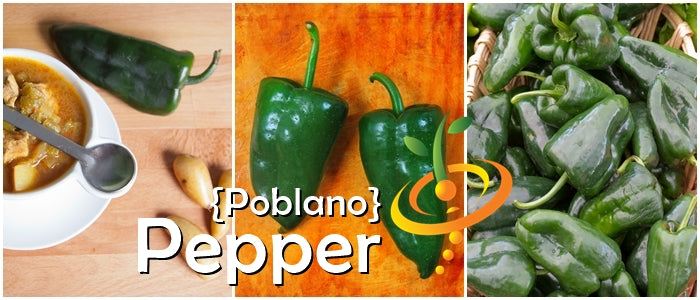
If you’re looking for the Chile Relleno pepper, you’ve found it. Except it goes by the name of Poblano. Prolific plants put out muchos 4"-8" thick-skinned, tapered fruits that start out a deep dark green with mild heat and earthy flavor. That’s when this pepper (chile) is most often roasted, peeled, and stuffed full (relleno) of meat and cheese. Let it ripen on the vine and the color changes to a deep dark brownish-red that’s much spicier. Or dry it, and you’ll have an Ancho pepper to flake or powder. This one will keep your oven busy all summer long.- Very high yields
- Earthy flavor
- Early producer
- Good for containers
SEED PLANTING TIPS
- Botanical name: Capsicum annuum
- Pepper length: 4"-8"
- Scoville heat units (SHU): 500-2,000/mild
- Plant support: Tomato cage or stake
- Depth to plant seeds: .25" deep
- Spacing between plants: 18"-24" apart
- Spacing between rows: 24"-36" apart
- Days to germinate (sprout): 7-21 days
- Germination soil temps: 75F-85F
- Soil needs: 6.0-7.0 pH
- Sun needs: Full sun
- Frost hardy: No
- Planting season: Spring, summer
- # of plants per sq. ft.: Appx. 1 plant per sq. ft.
- Days to maturity: 65-85 days
Good companion plants: Basil, Carrot, Cucumber, Eggplant, Okra, Rosemary, Sage, Squash, Tomato
All Peppers ⟐ Hot Peppers 📚 Hot Peppers Grow Guide - From $299 USDUnit price /Unavailable
Description
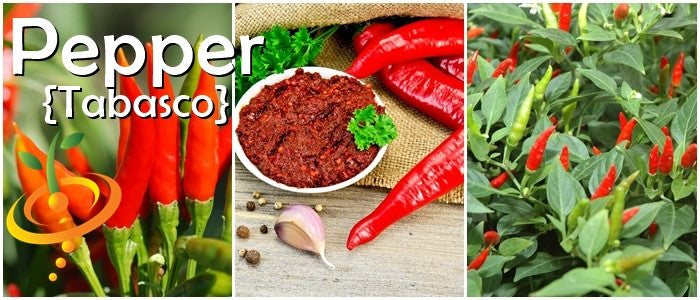
The Tabasco Pepper does not grow in a bottle, nor does it taste like salty vinegar. That’s something they came up with in Louisiana. It’s just a regular hard-working Joe that shows up even on the hottest days, pumping out 1"-2" peppers with tapered tips that point upward, ripening from green to yellow to orange to that famous hot sauce red. Heat tolerant and hardy enough to overwinter in warmer grow zones. With a spiciness similar to a Cayenne Pepper, it adds a distinct, smoky jolt to eggs, chili, stir fry, or salsa.
- High yields
- Heat tolerant
- Harvest any color
- Good for containers
SEED PLANTING TIPS
- Botanical name: Capsicum frutescens
- Pepper length: 1"-2"
- Scoville heat units (SHU): 30,000-50,000/hot
- Plant support: Tomato cage or stake
- Depth to plant seeds: .25" deep
- Spacing between plants: 18"-24" apart
- Spacing between rows: 24"-36" apart
- Days to germinate (sprout): 7-21 days
- Germination soil temps: 75F-85F
- Soil needs: 6.0-7.0 pH
- Sun needs: Full sun
- Frost hardy: No
- Planting season: Spring, summer
- # of plants per sq. ft.: Appx. 1 plant per sq. ft.
- Days to maturity: 80-90 days
All Peppers ⟐ Hot Peppers 📚 Hot Peppers Grow Guide All Peppers ⟐ Hot Peppers 📚 Hot Peppers Grow Guide Potato (Late-Season) Fingerling - Red Thumb (Organic/Heirloom)
From $299 USDUnit price /UnavailableDescription

About this variety:
- One of the best tasting of the fingerling potato varieties.
- It has rosy-buff skin with deep yellow flesh (blushed with red).
- Excellent for potato salad.
- Produces lots of medium-sized, well-clustered potatoes.
- Very good roasted over the coals.
- The tubers are long-keeping and the vines are very vigorous.
- Be careful not too overcrowd this variety.
We do not use chemicals to prevent our potatoes from sprouting. So the seed potatoes you order may have already begun to sprout when they arrive. This is okay-in fact some consider it desirable.
- From $299 USDUnit price /Unavailable
Description

- The Big Max pumpkin produces an extremely large (60"+ diameter and weighs 100+ lbs.) bright orange pumpkin
- Delicious bright yellow-orange flesh
- Perfectly suitable for carving
- Makes for a great pumpkin pie - How to Grow Super Giant MEGA Pumpkins
- Day to Maturity | 115-120 days
Additional DetailsThe word pumpkin originates from the word pepon, which is Greek for “large melon". The French adapted this word to pompon, which the British changed to pumpion and later American colonists changed that to the word we use today, "pumpkin".
- The Big Max pumpkin produces an extremely large (60"+ diameter and weighs 100+ lbs.) bright orange pumpkin
- From $299 USDUnit price /Unavailable
Description
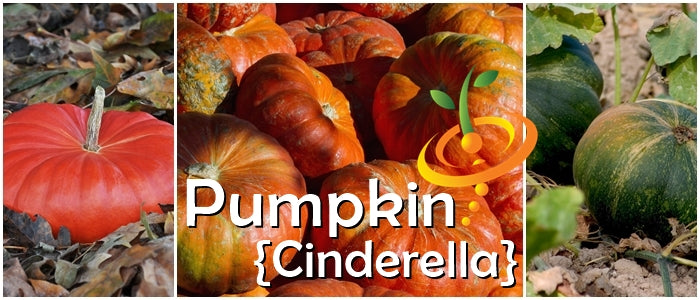
- The Cinderella is an old heirloom from France - looks just like the coach in the Cinderella fairy tale
- Plant produces medium-sized 25 lb. red/orange pumpkins
- This pumpkin has delicious flesh
- Days to Maturity | 100-110 days
Additional DetailsThe word pumpkin originates from the word pepon, which is Greek for “large melon". The French adapted this word to pompon, which the British changed to pumpion and later American colonists changed that to the word we use today, "pumpkin".
- The Cinderella is an old heirloom from France - looks just like the coach in the Cinderella fairy tale
- From $299 USDUnit price /Unavailable
Description

- Cucurbita pepo. Plant produces tiny 4" wide orange pumpkins
-
Very attractive and great for Halloween and Thanksgiving decorations
-
Days to Maturity | 100 days
Additional DetailsThe word pumpkin originates from the word pepon, which is Greek for “large melon". The French adapted this word to pompon, which the British changed to pumpion and later American colonists changed that to the word we use today, "pumpkin".
- From $299 USDUnit price /Unavailable
Description

- The Jack ‘O Lantern is a popular pumpkin variety that produces 10 pound fruits that are thick walled, and smooth skinned, round to slightly oblong
- The thick flesh is good for cooking, but really shines as a carving pumpkin. Has nice strong stems
- Days to Maturity | 110 days
Additional DetailsThe word pumpkin originates from the word pepon, which is Greek for “large melon". The French adapted this word to pompon, which the British changed to pumpion and later American colonists changed that to the word we use today, "pumpkin".

⭐ FEATURED COLLECTIONS
View all seeds listed A-Zcontinue shopping






















































































































































































































